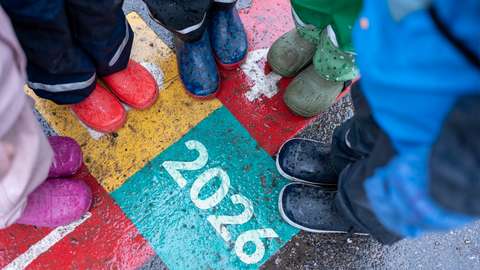Mayor’s budget proposal for 2026: The capital of children and youth invests in schools and day care centres

The Mayor’s budget proposal for 2026 emphasises education, the necessity of balancing the city’s finances, and controlled, sustainable growth.
The 2026 financial plan has been prepared responsibly, taking into account the overall growth of the population and service needs. Next year, EUR 1,513 million will be spent on providing services – an increase of EUR 55 million from the current year. Around EUR 400 million will be spent on investments next year.
Espoo’s local income tax rate for next year will be 5.3%. Tax funding is estimated to increase by EUR 77 million, totalling approximately EUR 1,365 million. In 2026, the annual contribution margin is estimated to be around EUR 217 million, and the result for the accounting period around EUR 1 million. Both figures are expected to improve slightly in the following years, provided that the general economic situation begins to improve.
Education takes priority
Espoo will continue its determined investment in the wellbeing of children and young people. The growth and learning sector shows the largest increase in expenditure – even more than in last year’s budget. The city will invest particularly in schools and day care centres. This is reflected not only in construction investments but also in staffing: within a year, there will be over 50 more teachers in comprehensive schools than there are now.
The growing proportion of pupils in need of special support continues to challenge teacher availability. Nevertheless, the weekly lessons supplementing the national curriculum, aimed at strengthening learning and individual support, will be retained. Major investments in early childhood education and schooling form a central part of the city’s investment programme.
“The number of children being born is increasing faster in Espoo than in any other Finnish city. That’s why we are prioritising education, and these services account for the largest increase in expenditure,” says Mayor Kai Mykkänen.
Finances under strain – need for adjustments of nearly EUR 100 million annually
Espoo’s financial situation is more difficult than it has been in decades. While expenditure is rising and investment pressures remain high, tax revenues are stagnating. The result for the accounting period will be a profit, but it will be modest in relation to the city’s investment needs. The revenue base will be strengthened by increasing real estate tax (EUR 14 million) and through parking and stormwater charges (approx. EUR 5 million), which will also support climate adaptation and carbon neutrality goals.
“The debt anchor determined by the City Council will provide clear guidelines for financial management. It will be difficult but achievable, as long as the reform of the central government transfers system does not hit Espoo too hard,” Mykkänen says.
During 2026, Espoo will have to thoroughly examine its expenditure and revenues. It is estimated that adjustments of nearly EUR 100 million will be needed annually.
Sustainable growth
Espoo will grow in a controlled manner, but the growth must not weaken the city’s economy. The budget proposal aims to ensure that Espoo will remain a pleasant and safe city where diversity, nature and technology coexist.
Espoo is a city of over 320,000 residents, with one in four speaking a mother tongue other than Finnish or Swedish. In relative terms, more children are born in Espoo than in other large cities in Finland, and the proportion of children in the population is the highest among the six largest cities.
“As a growing city, Espoo also understands its responsibility as an engine of Finland’s economy. It is our job to ensure that businesses, communities, research institutes and universities have the conditions to be successful,” Mykkänen says.
The budget proposal supports the vision of the Espoo Story: Espoo is the capital of children and youth, where balancing finances enables the provision of high-quality services and sustainable growth.
The City Council will decide on next year’s budget at its meeting on 4 December 2025, starting at 16:00.